Power Inverter without Heat Transfer: Exercise 7—Analyzing Results
This exercise describes how you analyze the results during and after the simulation. To hide CAD surfaces (not the fluid domain), switch between
 CAD Bodies
CAD Bodies and
 Flow Analysis Bodies
Flow Analysis Bodies.
Viewing the Pressure Contours on a Boundary
| Pressure: [Pa] : Flow 101325 101314 |
1. In Boundary Conditions, under General Boundaries select POWERINVERTER_1_FLUID.
2. In the Properties panel, View tab, for Surface, set values for the options as listed below:
◦ Keep drawing—Yes
◦ Grid—No
◦ Outline—No
◦ Variable—Pressure: [Pa] : Flow
◦ Min—101314
◦ Max—101325
3. Click

in the Graphics toolbar to display the style elements. Select
 Shading
Shading.
Viewing Vectors on a Section
| Pressure: [Pa] : Flow 101325 101314.75 |
1. Create a section.
2. Select Section 01.
3. In the Properties panel, Model tab, set values for the options as listed below:
◦ Type—Plane Y
◦ Position—0.006
4. In the Properties panel, View tab, for Surface, set values for the options as listed below:
◦ Variable—Pressure: [Pa] : Flow
◦ Min—101314.75
◦ Max—101325
5. In the Properties panel, View tab, for Vector, set Variable—Velocity: [m/s] : Flow
6. You can edit vector properties using the Size,Uniform Head, Head Size and Projection options.
7. In Boundary Conditions, under General Boundaries select POWERINVERTER_1_FLUID.
8. In the Functions panel click
 Turn on/off view properties
Turn on/off view properties and select the following from the list:
 Hide all surfaces
Hide all surfaces,
 Hide all grids
Hide all grids, and
 Hide all outlines
Hide all outlines.
9. Select Section 01. The vectors of this section appear.
Viewing the Streamlines in the Domain
| Velocity Magnitude: [m/s] : Flow 2.321 0 |
1. Add Streamline01 to the Flow Analysis Tree and select it.
2. In the Properties panel, Model tab, set values for the options as listed below:
◦ Line Thickness—0.0005
◦ Animation Time Size—0.005
3. In the Properties panel, View tab, for Surface, set values for the options as listed below:
◦ Variable—Velocity Magnitude: [m/s] : Flow
◦ Min—0
◦ Max—2.321
4. In the Flow Analysis Tree, under General Boundaries select BC_1.
5. In the Model tab, for Streamline01 set Release Particle to Yes.
Plotting the Mass Flux at the Outlet Boundary
1. In the Flow Analysis Tree, under Boundary Conditions click General Boundaries.
2. Select BC_2.
3. Click
 XYPlot
XYPlot. A new entity
xyplot1 is added in the Flow Analysis Tree under
Results >
Derived Surfaces >
XY Plots.
4. Select xyplot1.
5. In the Properties panel, Model tab, set the Variable as Mass Flux.
6. Click
 Stop
Stop and
 Run
Run, if required.
Plotting the Pressure at Monitoring Point
1. In the Flow Analysis Tree, under Results click Monitoring Points.
2. Select Point01.
3. Click
 XYPlot
XYPlot. A new entity
xyplot2 is added in the Flow Analysis Tree under
Results >
Derived Surfaces >
XY Plots.
4. Select xyplot2.
5. In the Properties panel, View tab, set Variable as Pressure.
6. Click
 Stop
Stop and
 Run
Run, if required.
 CAD Bodies and
CAD Bodies and  Flow Analysis Bodies.
Flow Analysis Bodies. CAD Bodies and
CAD Bodies and  Flow Analysis Bodies.
Flow Analysis Bodies. CAD Bodies and
CAD Bodies and  Flow Analysis Bodies.
Flow Analysis Bodies.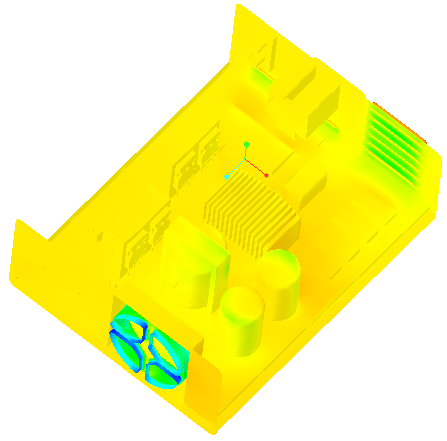

 in the Graphics toolbar to display the style elements. Select
in the Graphics toolbar to display the style elements. Select  Shading.
Shading.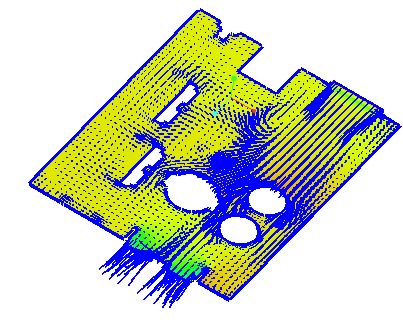

 Turn on/off view properties and select the following from the list:
Turn on/off view properties and select the following from the list:  Hide all surfaces,
Hide all surfaces,  Hide all grids, and
Hide all grids, and  Hide all outlines.
Hide all outlines.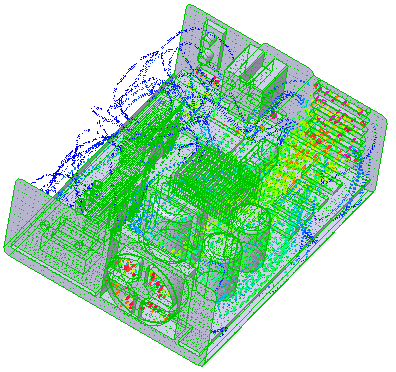

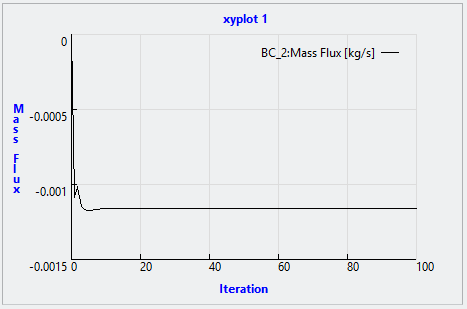
 XYPlot. A new entity xyplot1 is added in the Flow Analysis Tree under Results > Derived Surfaces > XY Plots.
XYPlot. A new entity xyplot1 is added in the Flow Analysis Tree under Results > Derived Surfaces > XY Plots. Stop and
Stop and  Run, if required.
Run, if required.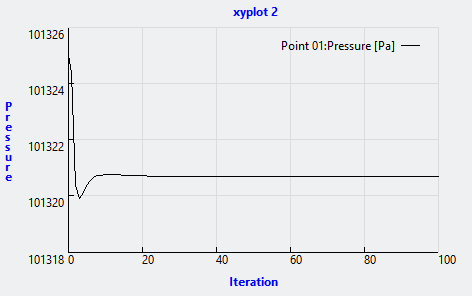
 XYPlot. A new entity xyplot2 is added in the Flow Analysis Tree under Results > Derived Surfaces > XY Plots.
XYPlot. A new entity xyplot2 is added in the Flow Analysis Tree under Results > Derived Surfaces > XY Plots. Stop and
Stop and  Run, if required.
Run, if required.